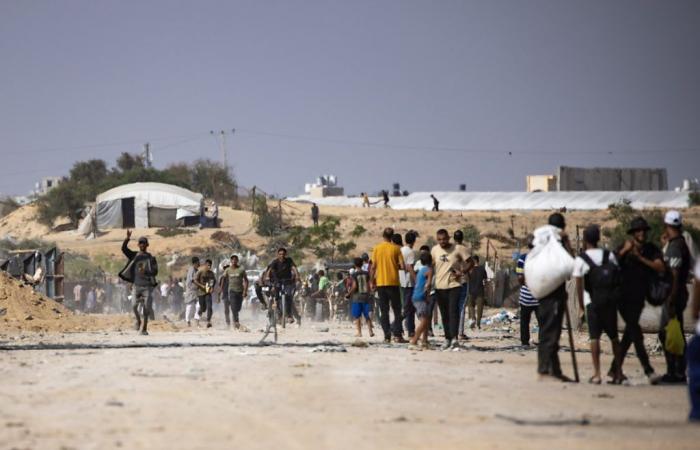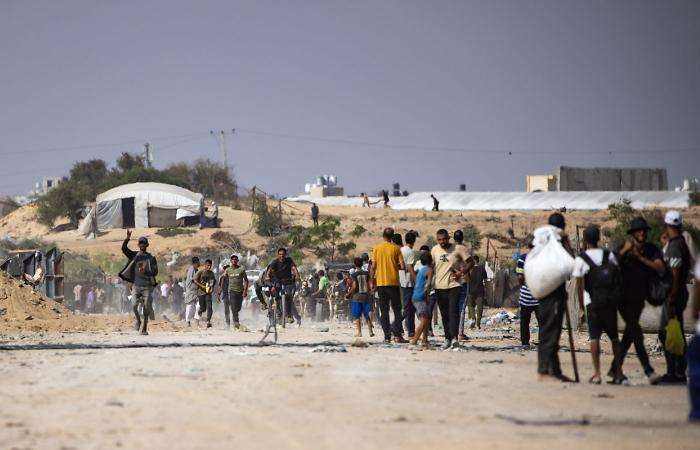Keystone-SDA
This content was published on
June 29, 2024 – 9:44 p.m.
(Keystone-ATS) Fierce fighting between the Israeli army and Hamas fighters in the northern Gaza Strip on Saturday left the living conditions of residents in the enclave “dire,” according to the UN agency for Palestinian refugees (UNRWA).
The war continues unabated across the Palestinian territory, and there are fears of a flare-up in Lebanon.
On May 7, Israeli troops launched a ground offensive in the southern city of Rafah, which Israel then presented as the last major Hamas stronghold. But fighting has since intensified in several other regions, particularly in the north.
Since Thursday, the Israeli army has been carrying out an operation in Shujaiya, an eastern district of Gaza City, where it says there are “terrorist infrastructures”.
“More than debris”
She said on Saturday that she had eliminated “dozens” of fighters in 48 hours, reporting “close combat with terrorists”. In a statement, it added that it had discovered observation posts, weapons, drones and a rocket launch pad near schools and tunnel entrances.
The Palestinian Civil Defense reported on Friday “numerous deaths” and the flight of “tens of thousands of civilians”, after a call by the army to evacuate the neighborhood.
In Gaza City, Civil Defense said four bodies and six wounded had been excavated from the rubble of a building hit by an Israeli strike in the al-Sedra area.
In central Palestinian territory, residents cleared rubble in the Maghazi refugee camp after an overnight strike on a house hit a medical center. “The pharmacy, the ophthalmology department and the emergency department were completely destroyed. There is nothing left but debris,” said Tarek Qandeel, the center’s director.
Further south, five bodies were discovered after a bombing of displaced people’s tents in the al-Mawasi sector, near Rafah, according to doctors. The army continues operations in this last town, bordering Egypt, saying it has eliminated “numerous terrorists”.
20 hospitals out of service in Gaza
Witnesses reported deaths and injuries among displaced people in the Shakush camp, west of Rafah, after a new incursion by the Israeli army and shooting. A source at the Nasser Medical Center in Khan Yunis said it had received four corpses from western Rafah.
The Hamas attack on Israel on October 7 resulted in the deaths of 1,195 people. Of the 251 people kidnapped, 116 are still being held in Gaza, of whom 42 have died, according to the Israeli army.
The Israeli offensive launched in retaliation on the Gaza Strip has so far left 37,834 dead, according to data from the Health Ministry of the Hamas-led Gaza government.
The war has caused a humanitarian catastrophe in the small, besieged Palestinian territory of 2.4 million people, more than half of whom have been displaced: water and food are in short supply and the health system is on its knees.
A total of 32 hospitals out of 36 in the Gaza Strip have been damaged since October 7, and of them 20 are now out of service, according to the World Health Organization (WHO).
UNRWA mission officer Louise Wateridge on Friday described living conditions in the Palestinian territory as “dire,” where humanitarian aid has been trickling in. Residents are living in ruined buildings or tents around a huge pile of rubbish, she told reporters in Geneva via video link from the centre of the Gaza Strip.
Risk of regional conflagration
Fears of the conflict spreading to Lebanon have recently been heightened by a verbal escalation between Israel and Hamas’ ally Hezbollah. Since October 7, the two sides have been exchanging fire almost daily in the border area, with deadly violence causing thousands of residents to flee on both sides of the border.
Tehran, an ally of Hezbollah, warned Israel on Saturday that the “axis of resistance,” which includes Iran and its regional allies, could mobilize if it launched a “large-scale” offensive in Lebanon.
On Wednesday, Israeli Defense Minister Yoav Gallant said Israel did not want war with Hezbollah, but warned that his country had “the capacity to take Lebanon back to the Stone Age.”







